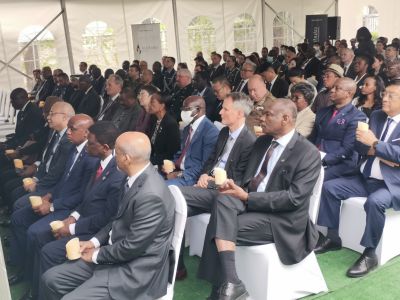|
Getting your Trinity Audio player ready...
|
A photographic exhibition commemorating the 31st anniversary of the 1994 genocide against the Tutsi in Rwanda (Kwibuka 31) was held in Beijing, China.
The solemn event, featuring video documentaries and survivor testimonies, highlighted the horrors of the genocide fueled by hatred and misleading ideology. It also showcased Rwanda’s determination, led by President Paul Kagame, to overcome the devastation. “We remember the victims, more than one million children, women and men murdered in just 100 days, most of them Tutsi, along with moderate Hutu and others who opposed the genocide. “We honour their memory and pay tribute to the courage and resilience of the survivors.
“Every act of remembrance is an act of defiance against the perpetrators’ intent, not only to destroy their lives, but also to erase people’s history,” said Dr. Changhee Lee, UN Resident Coordinator in China, in a tribute. Dr. Lee stressed that the genocide was a deliberate act, urging education for future generations to prevent such atrocities. “It was intentional, a merciless plan and brutally carried out by ordinary individuals led astray. “This unsettling reality is a warning that society is not immune to such danger. We must teach every new generation what happened in Rwanda in 1994 to help prevent such atrocity from ever happening again,” he said.
The genocide, from April 7 to July 15, 1994, was reportedly executed by extremist Hutu officers using military forces, with support from civilians, police, and government institutions. The Rwandan Patriotic Front (RPF) ended the genocide in July 1994 after capturing Kigali. The International Criminal Tribunal for Rwanda (ICTR), established in Arusha, Tanzania, prosecuted high-profile perpetrators, while domestic and community-based courts handled cases from 2005 to 2012. Rwanda has since made remarkable progress in reconciliation, healing, and justice.
“Rwanda has made an extraordinary journey towards reconciliation, healing and justice since the genocide, yet this terrible period in its history is a reminder that no society is immune from hate and horror,” said Antonio Guterres, UN Secretary-General in a message to mark the day. President Xi Jinping commended Rwanda’s resilience and rapid economic growth, stating, “China is ready to continue to support Rwanda to form a development partnership suitable for the country.” Rwanda now operates as an independent, sovereign, democratic, social, and secular republic, fostering peaceful co-existence, governance, and socio-economic development.
The World Bank reported Rwanda’s economy grew by 9.7 per cent in the first half of 2024, with GDP expected to maintain momentum in 2025-2026 due to tourism recovery, construction projects, and manufacturing activities. During the exhibition, Mr. James Kimonyo, Rwandan Ambassador to China, highlighted Rwanda’s history before colonization, noting its role in dividing the people and leading to the genocide.
He urged the global community to draw lessons and prevent recurrence. The event, themed “Remember – Unite – Renew,” included a candle-lighting ceremony and gathered officials from the Chinese government, diplomats, international organizations, and the Rwandan community in China.
Source: GNA


